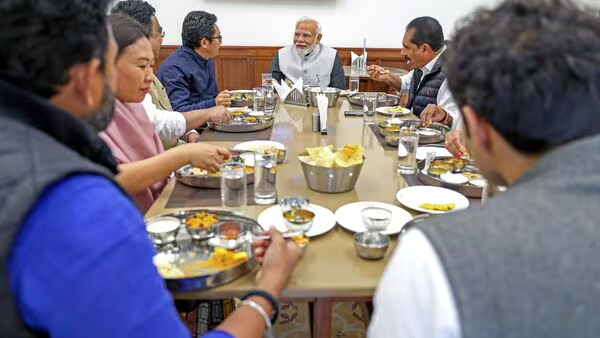Vice Presidential election scheduled for September 9 fast approaching, the Bharatiya Janata Party (BJP) is leaving no stone unturned. In a carefully calibrated move, the party has convened a two-day workshop for its Members of Parliament (MPs), beginning Sunday, September 7, at the GMC Balayogi Auditorium inside the Parliament complex. The training program is designed to align strategy, streamline coordination, and ensure maximum voter participation from the National Democratic Alliance (NDA) ranks.
In a telling sign of the seriousness attached to this exercise, both BJP National President JP Nadda and Prime Minister Narendra Modi have canceled their planned dinner interactions with MPs, originally slated for September 6 and 8. The cancellations underscore the party’s choice of substance over ceremony, placing strategic preparedness above social gatherings.
Strategic Cancellations: Focus on Polls and Flood Relief
Nadda had invited BJP MPs to his residence for a dinner on September 6, while Prime Minister Modi was to host a grand dinner for NDA MPs on September 8. Both programs have now been withdrawn.
For Nadda, the cancellation was intended to ensure that MPs remain in Delhi and focus on the high-stakes Vice Presidential election. Modi’s decision, however, carried a dual purpose: first, to avoid distractions for MPs ahead of the workshop, and second, to free himself to travel to flood-hit states to assess the damage and monitor relief efforts.
This dual development reflects the BJP’s balancing act—maintaining strict parliamentary discipline while also addressing the humanitarian crisis unfolding across several northern states hit hard by monsoon floods.
The cancellations have drawn attention in political circles, underscoring how the BJP leadership is prioritizing both electoral preparedness and national governance responsibilities in parallel.

The Two-Day Blueprint
The workshop will open on Sunday, September 7, at 11 AM, and continue until late in the evening. It will reconvene on Monday, September 8, from 3 PM to 6 PM, just a day before voting. The program has been structured to balance procedural training with strategic messaging.
BJP President JP Nadda will inaugurate the sessions, while senior ministers including Home Minister Amit Shah, Defence Minister Rajnath Singh, and Parliamentary Affairs Minister Pralhad Joshi will deliver guidance on parliamentary conduct and election strategy. Prime Minister Modi is also scheduled to attend, delivering what is expected to be a rallying address to MPs that emphasizes discipline, turnout, and unity within the NDA.
One of the highlights will be a mock voting drill – a practice session to ensure every MP is familiar with the secret ballot process, a format often vulnerable to confusion or cross-voting. In addition, MPs will be organized into smaller coordination groups, each led by senior NDA leaders, to ensure that every vote is accounted for on September 9.
Why the Election Matters
The upcoming Vice Presidential election carries weight far beyond filling a constitutional office. For the NDA, now in its third term at the Centre, the contest represents a chance to reaffirm its parliamentary dominance and present a united face to both allies and rivals.
The BJP’s Parliamentary Board has nominated CP Radhakrishnan as the NDA’s candidate. A veteran politician and former governor, Radhakrishnan is seen as both ideologically aligned with the party and a figure who offers regional outreach. His candidature was finalized after internal consultations where other names, including that of former Vice President M. Venkaiah Naidu, were considered.
On the opposition front, the INDIA bloc has fielded retired Justice B. Sudershan Reddy. In his campaign statements, Reddy has highlighted the apolitical nature of the Vice President’s office and invoked the legacy of former Vice Presidents such as Sarvepalli Radhakrishnan and K.R. Narayanan. However, given the NDA’s comfortable majority in both Houses, BJP leaders remain confident about Radhakrishnan’s prospects.
A Broader Strategy of Unity
The workshop is part of a larger choreography that reflects the BJP’s meticulous style of political management. Much like the “Karyashala” training sessions held before the abrogation of Article 370 in 2019, this exercise is designed to foster cohesion at a crucial juncture.
The party has already instructed MPs chairing parliamentary committees to wrap up or reschedule meetings on September 8, ensuring that members remain in Delhi and available for the polls. Beyond the workshop, the NDA also plans a show of strength through a huddle of ministers, chief ministers, and senior alliance leaders on the day of nomination – a display aimed at reinforcing unity.
Prime Minister Modi is further expected to address the NDA parliamentary party on Tuesday, September 9, coinciding with the resumption of the Monsoon Session’s second phase, in what could serve as a final pep talk before voting.
Leadership at the Helm
The active involvement of Modi, Amit Shah, and JP Nadda highlights the BJP’s top-down approach to election preparedness. While Modi’s presence provides morale and symbolism, Shah is expected to focus on turnout and coordination mechanics, while Nadda steers organizational discipline.
The cancellation of the planned dinners has been widely interpreted as an extension of this philosophy – a reminder that ritualistic gatherings must take a backseat to hard-nosed preparation. Extensive discussions held earlier at Nadda’s residence confirm that the leadership weighed multiple options before settling on Radhakrishnan as a consensus choice.
NDA’s Confidence, BJP’s Precision
As the countdown to September 9 begins, the BJP’s two-day workshop emerges as more than just a training exercise. It is a symbol of the party’s organizational precision and its emphasis on preparation over complacency. By keeping MPs anchored in Delhi, running mock drills, and stressing coordination with allies, the NDA leadership is making sure that its parliamentary numbers translate into a resounding electoral outcome.
With Prime Minister Modi, Amit Shah, and JP Nadda personally driving the effort, the message is unmistakable: the NDA intends to approach the Vice Presidential election not merely as a constitutional formality, but as a carefully managed political statement of unity and strength.

